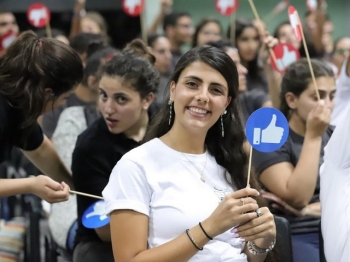How do young people live in the Holy Land?

We asked Archbishop Pierbattista Pizzaballa, Apostolic Administrator of the Latin Patriarchate of Jerusalem, to tell us something more about the life of the young people of the Holy Land, also in light of the Synod on Youth that took place last October.
Archbishop Pizzaballa, you took part in an important moment in the life of the Church in 2018: the Synod on young people, their faith and vocational discernment. What emerged from the Synod that is of particular relevance to young people in the Holy Land?
Nothing addressed directly the young people of the Holy Land. The Synod must produce documents of a general nature and the young people of the Holy Land are no different from the young people of the rest of the world. What has been interesting for me is that I have had the opportunity to listen to the experience of the bishops of other parts of the world because this helps us to view our problems in proportion to others. In fact, when we compare ourselves with others, we notice that the dynamics are quite similar.
However, the Holy Land has something special to offer to young people around the world...
During the Synod, there was talk of discernment, evangelization and transmission of the faith. In this context, the Holy Land is a particular place, unique I dare to say, because our faith as an incarnated and historical faith has its roots there. It is therefore a formidable instrument of evangelization and re-evangelization. In this sense, organized pilgrimages to the Holy Land for young people, which are increasingly frequent initiatives, are an extraordinary occasion and usually constitute a point of no return.
In recent years, the Latin Patriarchate has invested particular energy in the activities of the catechetical office. Can you tell us something about this?
All our catechetical manuals were a little dated and it was necessary to rethink them keeping in mind the generational changes that have taken place. For this reason, an effort was made to create a new edition that is not only more attractive in format but rewritten with awareness of the mindset of our young people. These manuals were not written by nuns and priests but by involving the young people themselves with their sensitivity. It was and still is a wonderful experience: the joyful participation of the young people who felt involved was thrilling. If we had done this with the usual priests, it would have been an extra mandate perhaps accomplished with difficulty, but instead this has set in motion positive dynamics and it is a methodology that needs to be extended also in other sectors.
The schools are an important institution of the Latin Patriarchate and the members of the Order of the Holy Sepulchre support them with conviction. What determines their centrality at the heart of the diocese you are called to administer?
Without schools, there is no church. More than the parish and other activities, the school is the reference point around which the Christian community revolves. The hearts of families are children and the first concern of parents is their formation. Therefore, we reach families through the schools.
The question of Christian identity and community, also pass through the school. The school creates communities starting with children. Often if you invite families to a formation course, they do not come, but if you contact them to talk about school matters or the young people, they come immediately because it is something they care about deeply.
Another important aspect is that through the school we come into contact with the territory. In our schools, the majority of students are often Muslim. It is in our vocation to be in dialogue with everyone, not only in an abstract or theological way but also by experimenting the dialogue of life, and school in this sense is fundamental.
How do young people experience the complex political situation in the lands they inhabit?
It is difficult to find one word that would encompass all the young people in this field. The young, because of their age, are more passionate and expresses their passion in different ways: there are those who fight their way through life and this happens more with young Muslims than Christians; those for whom passion becomes frustration in the face of yet another spiral of violence and future perspectives that close more than open up; or there are those who roll up their sleeves to get back into the game. We need to invest in this last group that certainly does not make news like the others but that exists.
Interview by Elena Dini
(April 2019)



